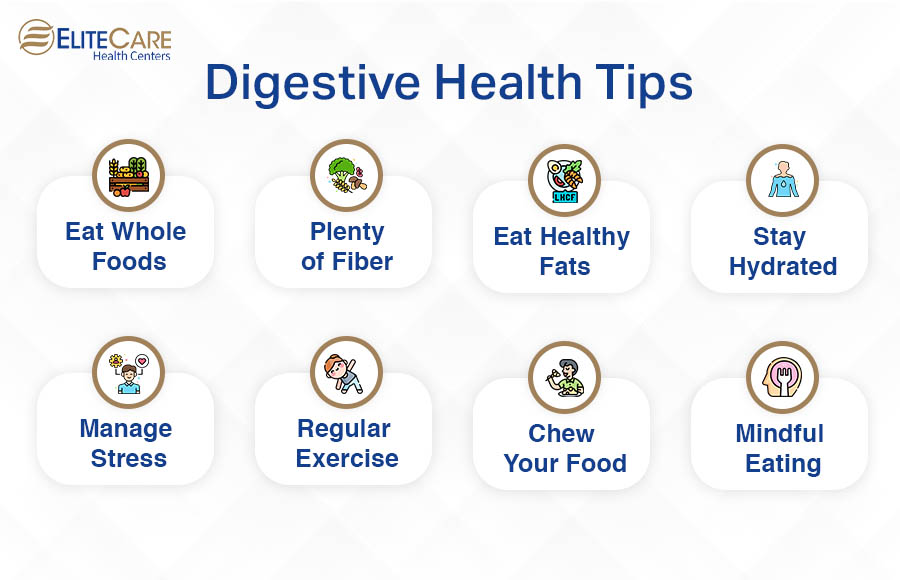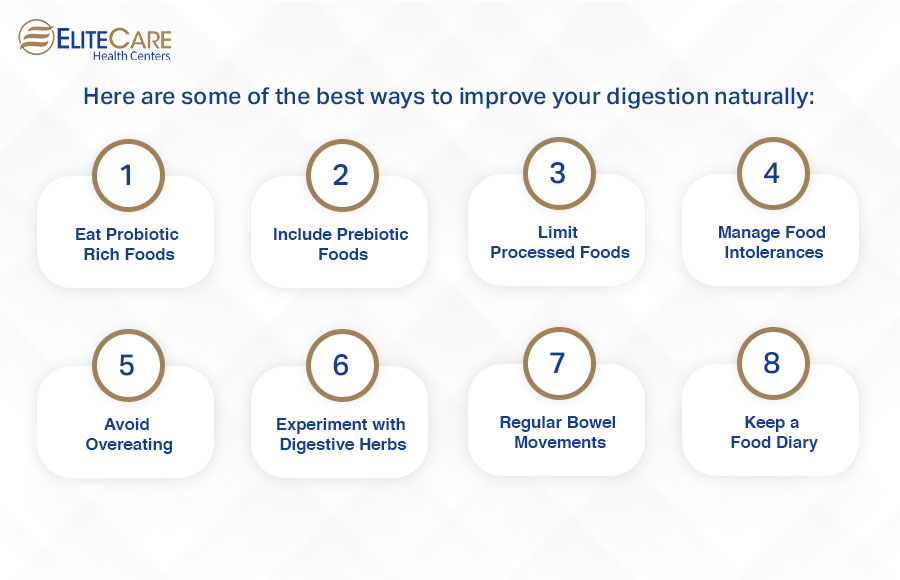
Your general wellness depends on your digestive health. A healthy stomach affects mood, energy levels, and even immunological function in addition to ensuring adequate digestion and food absorption.
However, digestive problems are becoming more and more widespread in today’s fast-paced environment, impacting millions of individuals globally. Maintaining gut health is crucial, as it can prevent everything from bloating and gas to more serious illnesses like irritable bowel syndrome (IBS) and inflammatory bowel disease (IBD).
Digestive Health Tips
Your digestive system is constantly producing energy for each cell in your body and effectively eliminating waste. Neglecting your digestive system health can have negative impacts on all aspects of your life.
Your digestive health is significantly influenced by your diet and other lifestyle decisions, which are frequently areas where little adjustments can have a huge influence. Adopting lifestyle changes that support the complex functioning of the gastrointestinal system is necessary to achieve good digestive health.
Here are some essential tips to keep your stomach happy and healthy:

1. Eat Whole Foods:
Choose whole, minimally processed natural foods that are high in nutrients and free of any artificial ingredients. Eating processed foods has been associated with a higher risk of digestive problems.
The main components of your diet should be whole grains, lean meats, fresh produce, healthy fats, and lean proteins. These foods supply vital nutrients—vitamins, minerals, antioxidants, and dietary fibers—that are necessary for healthy digestion.
To ensure that processed foods are devoid of trans fats, it’s important to check the labels. In addition to their well-known adverse effects on heart health, these fats have also been linked to a higher chance of developing inflammatory bowel disease.
2. Choose Plenty of Fiber:
Fiber is very helpful for healthy digestion. As it encourages regular bowel movements, prevents constipation, and supports a healthy gut microbiota, it is essential for maintaining digestive health. Try to eat a range of foods high in fiber every day, such as whole grains, legumes, fruits, and vegetables.
Another kind of fiber that supports the good bacteria in your stomach is called prebiotics. It has been shown that diets rich in this fiber enhance barrier performance and reduce gastrointestinal irritation.
3. Include Healthy Fats In Your Diet:
In addition to being necessary for the proper absorption of certain nutrients, such as vitamins A, D, E, and K, fat also makes you feel fuller after a meal.
Include healthy fats in your meals, such as those in nuts, seeds, avocados, and fatty fish. These fats promote general digestive function, lower inflammation, and help absorb nutrients.
According to certain research, consuming omega-3 fatty acids may reduce your chance of getting ulcerative colitis and other inflammatory bowel disorders.
4. Stay Hydrated:
Sufficient hydration is necessary for healthy digestion and absorption of nutrients. Constipation is frequently caused by a low fluid intake. Water helps transport food through the digestive tract more easily and softens feces, which makes it easier to pass.
Aim to drink plenty of water throughout the day, and limit consumption of dehydrating beverages like alcohol and caffeinated drinks. If you exercise vigorously, are feeling under the weather, or are in a warm climate, you may require more water than usual.
5. Manage Stress:
Long-term stress can have a disastrous effect on digestive health, resulting in symptoms such as indigestion, abdominal pain, and irregular bowel movements.
Your digestion is strongly impacted by stress hormones. Your body believes you don’t have time to rest and digest when it is in fight-or-flight mode. When under stress, your digestive tract receives less blood and energy.
To induce relaxation and enhance digestive wellness, try stress-relieving methods like yoga, deep breathing, relaxation exercises, mindfulness meditation, or spending time in nature.
6. Regular Exercise:
Through the promotion of peristalsis, or the rhythmic contractions of the intestines, physical exercise promotes digestion. It reduces the chance of nausea, bloating, and constipation by facilitating the faster passage of food through your digestive tract.
Try to get in at least 30 minutes of moderate regular exercise most days of the week to maintain the best possible health for your digestive system. Additionally, taking a walk after a meal may help your body in moving things along.
7. Chew Your Food Thoroughly:
Proper chewing is the first step in the digestive process. Take the time to chew your food thoroughly, allowing enzymes in saliva to begin breaking down carbohydrates and facilitating easier digestion further down the gastrointestinal tract.
8. Practice Mindful Eating:
Mindful eating involves paying attention to the sensory experience of eating, including taste, texture, and smell, while also being attuned to hunger and satiety cues. By eating slowly and mindfully, you can prevent overeating, reduce digestive discomfort, and enhance nutrient absorption.
Best Ways to Improve Your Digestion Naturally
While certain digestive issues may require medical intervention, many common digestive complaints can be alleviated or even prevented through natural means.
Here are some of the best ways to improve your digestion naturally:

1. Eat Probiotic-Rich Foods:
Probiotics are beneficial bacteria that promote a healthy balance of gut microbiota, aiding in digestion and supporting immune function. Incorporate probiotic-rich foods such as yogurt, kefir, sauerkraut, kimchi, and kombucha into your diet to boost digestive health.
2. Include Prebiotic Foods:
Prebiotics are non-digestible fibers that serve as fuel for probiotic bacteria, helping them thrive in the gut. Whole grains, garlic, onions, leeks, asparagus, and bananas are foods high in prebiotics. By including these foods in your diet, you can nourish your gut microbiome and support digestive wellness.
3. Limit Processed Foods and Added Sugars:
Processed foods high in refined sugars, artificial additives, and unhealthy fats can disrupt gut health and contribute to digestive issues. Opt for whole, nutrient-dense foods whenever possible, and minimize your intake of processed snacks, sugary treats, and fast food.
4. Manage Food Intolerances:
Pay attention to how your body reacts to different foods and ingredients. Common food intolerances, such as lactose intolerance or gluten sensitivity, can cause digestive discomfort and other symptoms. If you suspect you have a food intolerance, consider eliminating the offending food or ingredient from your diet and seek guidance from a healthcare professional.
5. Avoid Overeating and Late-Night Eating:
Eating large meals or snacking late at night can strain the digestive system and disrupt sleep patterns. Aim to eat smaller, more frequent meals throughout the day, and avoid heavy or rich foods close to bedtime to promote optimal digestion and restful sleep.
6. Experiment with Digestive Herbs and Supplements:
Certain herbs and supplements may offer digestive support and symptom relief. For example, ginger and peppermint can help alleviate nausea and indigestion, while digestive enzymes and hydrochloric acid supplements may aid in the breakdown and absorption of nutrients. However, it’s essential to consult with a healthcare provider before starting any new supplement regimen.
7. Stay Regular with Your Bowel Movements:
Regular bowel movements are a sign of good digestive health. If you’re experiencing constipation, try increasing your fiber intake, staying hydrated, and engaging in regular physical activity. Conversely, if you’re dealing with diarrhea or loose stools, focus on consuming soothing, easily digestible foods and avoiding triggers such as caffeine and spicy foods.
8. Keep a Food Diary:
Keeping track of your dietary habits and any associated symptoms can help you identify patterns and triggers that may be affecting your digestive health. Note what you eat, when you eat it, and how you feel afterward, and look for correlations between specific foods or behaviors and digestive symptoms.
Achieving and maintaining digestive health is essential for optimal functioning of the body and overall well-being. By adopting healthy lifestyle habits, including eating a balanced diet, staying hydrated, managing stress, and getting regular exercise, you can support digestive function and prevent common digestive issues.
Remember that individual responses to dietary and lifestyle changes may vary, so it’s essential to listen to your body and seek guidance from a healthcare professional if you experience persistent or severe digestive symptoms. Book an appointment with the best digestive health specialists at EliteCare HC. Call +1 888-596-2090 or simply visit our website for an appointment.
Frequently Asked Questions
The most common digestive problems include indigestion, heartburn, bloating, gas, constipation, diarrhea, and irritable bowel syndrome (IBS).
You can improve digestion naturally by eating whole foods, getting plenty of fiber, staying hydrated, managing stress, getting regular exercise, and practicing mindful eating.
To promote better digestive health, it’s best to limit or avoid processed foods, added sugars, artificial additives, unhealthy fats, and trigger foods that may exacerbate digestive issues.
You should consider seeing a doctor if you experience persistent or severe digestive symptoms such as abdominal pain, bloating, changes in bowel habits, unexplained weight loss, or blood in the stool.





